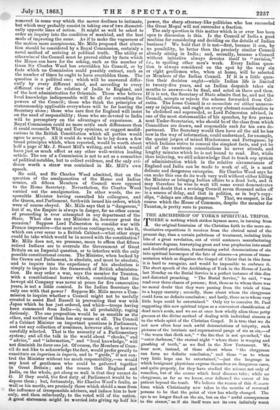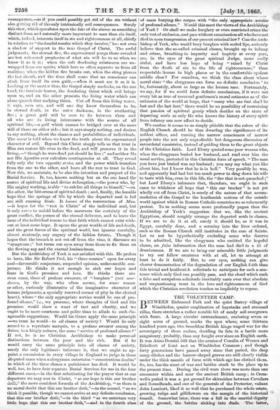THE ARCHBISHOP OF YORK'S SPIRITUAL TRIPOS. THERE is nothing which
strikes laymen more, in turning from
the original fountains of the Christian faith to the more au- thoritative expositions it receives from the clerical mind of the present day, than a certain paltriness of treatment, isolating little bits of a great revelation, out of vivid sentences manufacturing miniature dogmas, travestying great and true prophecies into small and doubtful predictions, transforming awful denunciations of sin into spiritual horoscopes of the fate of sinners—a process of trans- mutation which so disguises the Gospel of Christ that in this form it is hard to recognize, and would be impossible to embrace it. The short speech of the Archbishop of York in the House of Lords last Monday on the Burial Service is a perfect instance of this dim and distorted preaching. "The Burial Service," he said, "was read over three classes of persons ; first, those as to whom there was no moral doubt that they were passing from the trials of time to a happy eternity ; secondly, those about whom the clergyman could form no definite conclusion ; and lastly, those as to whom very little hope could be entertained." Only try to conceive St. Paul suggesting this new spiritual tripos as a convenient classification of dead men's souls, and we see at once how wholly alien these petty guesses at the divine method of dealing with individual sinners is to the whole spirit of the Christian Gospel. It is true that we do not now often hear such awful denunciations of iniquity, such pictures of the intrinsic and supernatural pangs of sin as sin,—of "the worm that dieth not," "the fire that is not quenched," the "outer darkness," the eternal night "where there is weeping and gnashing of teeth," as we find in the New Testament. We hear now, instead, of those about whom "the clergyman can form no definite conclusion," and those "as to whom very little hope can be entertained,"—just the language in which benignant physicians express themselves on dangerous cases, and quite properly, for they have studied the science not only of remedies, but of the course which fatal diseases take ; while no clergyman, as far as we know, ever followed the career of his patient beyond the tomb. We believe the reason of this (1.:-nu.rer form which Christianity now takes in the mouths of reverend persons to be that the point of view has wholly changed. The eye is no longer fixed on the sin, but on the "awful consequences to the sinner," as if sin itself were not its own infinitely worst
consequence,—as if you could possibly get rid of the sin without also getting rid of the only intrinsically evil consequences. Surely this view, which speculates upon the fate of the sinner as something distinct from and naturally more important to man than sin itself, which, indeed, interests itself in sin and righteousness at all, chiefly in relation to "the fearful results which they involve," has not even a shadm of support in the true Gospel of Christ. The awful judgments, the eternal fire, the supernatural pangs there revealed are but reiterated prophecies of what sin will be to us when we know it as it is ; when the soft deadening substances are un- wrapped from our spirits, which here so often separate us from all realities; when the hidden fire breaks out, when the sting pierces the last sheath, and the time shall come that no conscience can cloak from itself its own guilt,—when it must see it as it is. Looking at the matter thus, the Gospel simply uncloaks, on the one hand, the intrinsic horror, the desolating thirst which evil brings upon us, and on the other presents the living water which can alone quench that undying thirst. Cut off from this living water, it says, men are, and will one day know themselves to be, in eternal death, in the outer darkness, in the everlasting fire ; a great gulf will be seen to lie between them and all who are in living intercourse with the source of all spiritual life,—.a gulf which cannot be bridged over at the mere will of those on either side ; but it says simply nothing, and desires to say nothing, about the chances and probabilities of individuals. The worst is told when we know the truth about the supernatural character of evil. Beyond this Christ simpiy tells us that trust in Him can restore life even to the dead, and will preserve it in the living,—" though he were dead yet should he live ;" and neither He nor His Apostles ever calculate contingencies at all. .They reveal fully only the two opposite states, and the power which transfers from the one to the other, and leave all the rest to trust in God. Now this, we maintain, to be also the intention and purport of the Burial Service. It, too, knows nothing but on the one hand the source of spiritual life and divine redemption,—the power who, by His mighty working, is able "to subdue all things to himself,"—on the other, the bitterness of spiritual death ; and, finally, the humble hope that the springs of life by which the departed soul is fed are still running fresh. It knows of the resurrection of Man, —it hopes for the "rest in Christ" of the individual soul, but it only cares to unfold before the mourners the certainty of the great conflict, the person of the eternal deliverer, and to leave the issue of the individual rescue to that faith which cannot exist with- out at least some hope. It opens the great worlds of life and death, and the great forces of the spiritual world, but ignores carefully, almost anxiously, any augury of the hidden future. Though it hopes that the branch is not cut off from the vine, it discusses no "symptoms ;" but turns our eyes away from these to fix them on the flowing sap and the eternal husbandman.
But the Archbishop of York is not satisfied with this. He prefers to have, like Sir Robert Peel, his "three courses" open for every soul—favourable conjecture, suspended opinion, unfavourable con- jecture. He thinks it not enough to sink our hopes and fears in God's promises and love. He thinks there are even cases, those of profane swearers, of " burglars " (not mur- derers, by the way, who often secure, for some reason or other, curiously illustrative of the imaginative character of human judgments, a specially reserved corner of pity in the clerical heart), where " the only appropriate service would be one of pro- found silence," i.e., we presume, where thoughts of God and His promises would show a want of tact and charity, and we ought to be more courteous and polite than to allude to such dis- agreeable suggestions. Would his Grace apply the same principle —we trust he would—to all classes of society ? Would he only accord to a reprobate marquis, to a profane swearer among the dukes, to a kingly seducer, the same "service of profound silence ?" If not, he is no Christian Archbishop to make persoual distinctions between the poor and the rich. But if he would carry the same principle into all classes of society, surely the only legitimate inference is, that we ought to ap- point a commission in every village in England to judge in those disputed cases when a clergyman entertains "conscientious doubts" in which of the three classes a parishioner has died. It would be well, too, to have four separate Burial Services for use in the four different cases,—in the first substituting for the prayer that at our departure we may rest in Christ, "as our hope is this our brother ;loth," the more confident formula of the Archbishop, "as there is no moral doubt that this our brother doth,"—in the second, "as we think it possible, though we cannot arrive at any definite conclusion, that this our brother doth,"---in the third "as we entertain very little hope that this our brother doth,"—and in the fourth class of eases burying the corpse with "the only appropriate service of profound silence." Would this meet the views of the Archbishop of York ? Or shall we make burglary or even convicted crime the only test of exclusion, and pass without examination all who have not died in open trangression of our present criminal law? Can the Arch- bishop of York, who would bury burglars with sealed lips, seriously believe that the so-called criminal classes, brought up in infamy and crime, breathing-in impurity and impiety at every pore, are, in the eyes of the great spiritual Judge, more really sinful, and have lees hope of being "raised by Christ from the death of sin to the life of righteousness," than respectable license in high places or in the comfortable opulent middle class? For ourselves, we think the class about whose moral state "the clergyman can form no definite conclusion" to be, fortunately, about as large as the human race. Fortunately, we say, for if we could form definite conclusions, if it were not every bit as true of reverend gentlemen's moral estimates as of the estimates of the world at large, that "many who are first shall be last and the last first," there would be no possibility of restraining that passion of spiritual gossip which decides on the state of departing souls as only He who knows the history of every spirit from infancy can now affect to decide.
We confess it seems to us simply pitiable that the rulers of the English Church should be thus dwarfing the significance of its noblest offices, and turning the narrow consciences of narrow people into the not only unprofitable but dangerous discussion of sareerdotal casuistries, instead of guiding them to the great objects of the Christian faith. Lord Ebury quoted some poor woman who,. when the clergyman buried her husband, and read over him the usual service, protested in this Christian form of speech, "The man you have just buried was my husband ; you may say what you like about him, but I know that he is in hell." Very possibly he was, and apparently had had but too much power to drag down his wife to taste with him, even in this life, the "fire that is not quenched ;" but Lord Ebury's inference that, therefore, we ought in such cases to withdraw all hope that "this our brother" is not yet wholly cut off from Christ, is surely of the nature of that accom- modation of the Gospel to the heathenish notions of the outside world against which in Roman Catholic countries we so vehemently protest. To us nothing seems more profoundly pagan than the Archbishop of York's suggestion that we, like the ancient Egyptians, should roughly arrange the departed souls in dames. If we are to do it at all, surely it should be, as it was in Egypt, carefully done, and a scrutiny into the lives ordered,. such as the Roman Church still institutes in the case of Saints. Let us not be hypothetically excluding some who deserve to be admitted, like the clergyman who omitted the hopeful clause, on false information that the man had died in a fit of drunkenness. If we are to bring our miserable little judgments to try our fellow creatures with at all, let us attempt at least to do it fairly. But, to our eyes, nothing can give clearer demonstration of the degradation of our English faith than this trivial and beethenish solicitude to anticipate for each a sen- tence which only God can possibly pass, and the cloud which such a false and scrupulous solicitude inevitably casts over that absolute and unquestioning trust in the love and righteousness of God which the Christian revelation teaches us implicitly to repose.































 Previous page
Previous page